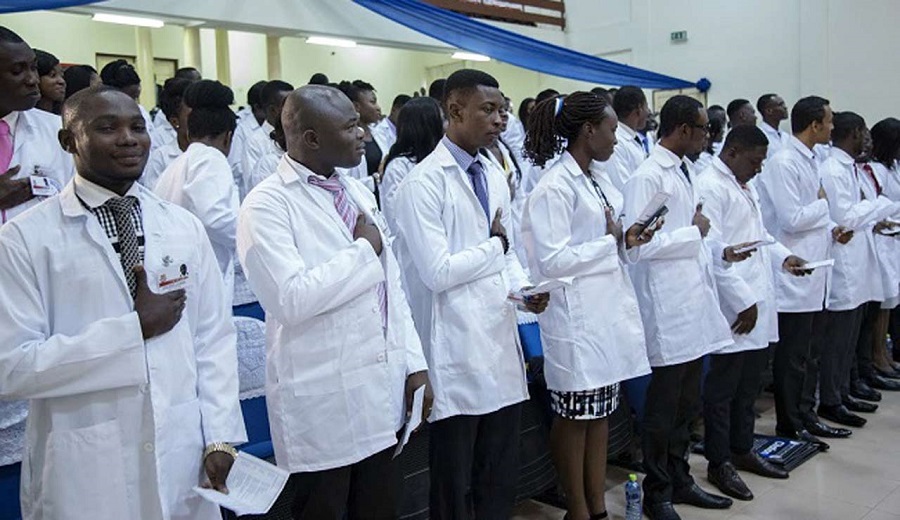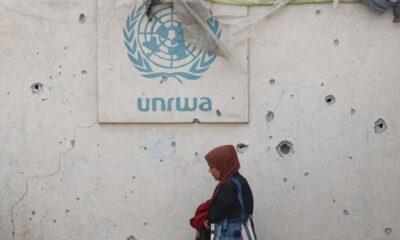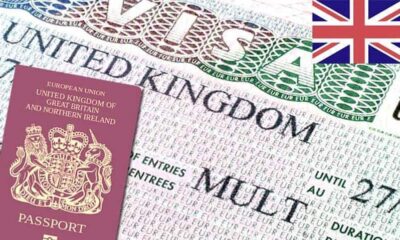Dr. Mohammed also highlighted ongoing efforts to address zero-dose immunization in some local government areas (LGAs) of Bauchi State. He emphasized the media’s significant role in this regard, noting that immunization drives have been designed to take place on market days, during naming ceremonies, and at other gatherings where women and children are present.
Health
Dentist shortage: UK to waive qualifying exam for foreign dentists

Dentist shortage: UK to waive qualifying exam for foreign dentists
The UK government is currently making plans to permit foreign dentists to practice their profession without undergoing a qualification exam in a bid to address the shortage of dentists.
The proposed changes therefore aim to expedite the process, allowing foreign dentists to commence work sooner. Currently, dentists from non-European countries must pass an overseas entrance exam to work in Britain.
The General Dental Council (GDC) would therefore be empowered to provisionally register dentists based on its assessment of their qualifications, ensuring patient safety and care quality are upheld, while dentists on the provisional register would require supervision.
-
Shortage of dentists
A significant majority of NHS dental practices are unable to accommodate new patients, resulting in a notable increase in emergency room visits for dental issues, particularly among children with tooth decay.
Also, the shortage of NHS dentists has led to long queues forming outside a new dental practice in Bristol, the first in the city to accept new patients in over six months.
READ ALSO:
- Heatwave: Drink more water, doctors issue health care tips
- Police arrest house help for allegedly stealing employer’s $51,000 in Lagos
- Nigerian woman, Chidinma Thompson, appointed as first black Judge in Canada’s Kings court
The situation escalated to the extent that police had to intervene as the practice struggled to accommodate the overwhelming demand, resulting in the disappointment of many patients.
The dental union has therefore criticized the government for attempting to address the shortage without tackling the underlying issues deterring dentists from NHS work.
On the other hand, Health Minister Dame Andrea Leadsom The shortage of NHS dentists has led to long queues forming outside a new dental practice in Bristol, the first in the city to accept new patients in over six months.
-
Current situation
Currently, dentists who obtain their qualifications outside of the European Economic Area (EEA) such as Nigeria must undergo an examination administered by Britain’s dental regulator, the GDC.
This is with the exemption of dentists holding qualifications from 14 specific universities in Australia, South Africa, Singapore, Hong Kong, Malaysia, and New Zealand are exempt from this examination requirement, only if they graduated before 2001.
Health authorities have characterized this UK entrance exams as “red tape,” attributing them to “prolonged delays” in dentists’ registration processes and subsequent commencement of treatment for patients.
Dentist shortage: UK to waive qualifying exam for foreign dentists
Health
Bauchi to shut down health centres during nationwide protest

Bauchi to shut down health centres during nationwide protest
The Bauchi State Government has announced plans to close all Primary Healthcare Centres (PHCs) on the day of the proposed nationwide anti-government protest. The decision aims to protect the lives of healthcare staff and patients amidst potential security threats.
Dr. Rilwanu Mohammed, Executive Chairman of the Bauchi State Primary Healthcare Development Board, made this announcement at the opening of the bi-annual media engagement on PHC Services Reporting Techniques held in Bauchi on Tuesday.
“Security reports have indicated that our PHCs may be targeted during the protest. We are not willing to risk the lives of our staff and patients. So, we will be closing these facilities,” Dr. Mohammed said.
READ ALSO:
- Trouble in Edo APC, members protest Philip Shaibu’s return [VIDEO]
- Protest: Oba of Benin urges Nigerians to be patient with govt
- Kidnappers paid us 15% ransom commission for providing victims bank details – Suspects
He added that healthcare staff would be on holiday during the protest to avoid potential attacks. “Normal services will resume after the protest concludes. The board has informed security agencies to protect healthcare facilities across the state,” he added.
Health
HIV prevention: Experts excited about trial results of injectable Lenacapavir

HIV prevention: Experts excited about trial results of injectable Lenacapavir
Experts attending the ongoing 25th International AIDS Conference in Germany have commended the results from the PURPOSE 1 trial of twice-yearly injectable Lenacapavir for Human Immunodeficiency Virus (HIV) prevention. An expert, Gail Bekker, who presented the results of the trial, confirmed that Lenacapavir demonstrated 100 per cent efficacy for HIV prevention in cisgender women – denoting or relating to a woman, whose gender identity corresponds with the sex registered for them at birth.
The conference is holding physically and virtually in Munich, Germany, this week. Over 10,000 participants from around the world are attending the event. A statement by Sharon Lewin, who is the President of International AIDS Society, AIDS 2024 International Co-Chair and Director of the Peter Doherty Institute for Infection and Immunity at the University of Melbourne in Australia, confirmed the results from the trial. The statement reads: “These data confirm that twice-yearly Lenacapavir for HIV prevention is a breakthrough advance with huge public health potential. If approved and delivered – rapidly, affordably, and equitably – to those who need or want it, this long-acting tool could help accelerate global progress in HIV prevention.
READ ALSO:
- Hardship: Nigerian students gear up for nationwide protest
- Edo couple who trafficked woman to Dubai jailed 5 years
- Borno protesters demand reinstatement of Ndume as Senate whip
“We all owe a debt of gratitude to the thousands of young women in South Africa and Uganda who volunteered to be part of this study. Now we eagerly await results from PURPOSE 2, which is assessing twice-yearly Lenacapavir for HIV prevention in other populations and countries. In the meantime, all stakeholders must work together to accelerate equitable delivery of existing HIV prevention options, and do more to prepare for future options, such as lenacapavir for PrEP.
“Much of this work is underway this week at AIDS 2024, and will continue at HIVR4P 2024, the 5th HIV Research for Prevention Conference, which will take place in Lima, Peru, and virtually from 6 to 10 October 2024.”
The AIDS conference is the premier global platform to advance the HIV response. As the world’s largest conference on HIV and AIDS, it sits at the intersection of science, advocacy and human rights, bringing together scientists, policy-makers, healthcare professionals, people living with HIV, funders, media and communities. Since its start in 1985, the conference has served as an opportunity to strengthen policies and programmes that ensure an evidence-based response to HIV and related epidemics. HIV is a virus that attacks the body’s immune system. Acquired immunodeficiency syndrome (AIDS) occurs at the most advanced stage of infection. HIV targets the body’s white blood cells, weakening the immune system.
HIV prevention: Experts excited about trial results of injectable Lenacapavir
Health
Lagos doctors plan indefinite strike over allowance, others

Lagos doctors plan indefinite strike over allowance, others
Medical doctors in Lagos State have threatened to embark on an indefinite strike over poor working conditions and non-implementation of ‘CONMESS allowance,’ among others.
In a petition to the state governor, Babajide Sanwo-Olu on Wednesday, the doctors under the aegis of the Medical Guild, called on him to quickly intervene and prevent a breakdown in healthcare services.
Part of the demands of the doctors, include immediate payment of the reviewed CONMESS allowance, appropriate entry levels for specialists, the implementation of pension deductions for resident doctors, and the recruitment of more medical personnel to bridge manpower shortage.
The Chairman of the Medical Guild, Dr. Moruf Abdulsalam, disclosed that the Guild will be holding a congress in the next couple of days to decide on the next line of action.
He noted, according to report, that the demotion of specialist consultants has led to loss of income, low morale, and lack of interest from prospective specialists in joining the state health service. Another disincentive, Abdulsalam pointed out, is non-deduction of contributory pension and NHF deductions for resident doctors in Lagos.
READ ALSO:
- Abacha family drags Tinubu, Wike to appeal court over Abuja property
- Wanted Lagos drug baron, Temo, arrested
- NLC can’t withdraw from protest it didn’t organise – Ajaero
He said: “The globally recognised JAPA syndrome remains an inadequately recognised crisis, and the apparent lukewarm approach of the state government towards the above-highlighted issues only serves to tilt the Lagos doctors’ endurance to the breakpoint.
“An average of two to three doctors resign from our primary and secondary facilities every month without commensurate replacement. This has led to overwork, chronic fatigue, burnout, and strained family relationships for the remaining doctors with many grappling with chronic medical conditions from the stress and overwork.”
The Medical Guild chairman noted that the current economic challenges have worsened the situation.
“These factors are currently heightening the tension and fuelling the haemorrhage of doctors from the state to private establishments and then outside of the country.
“Nigeria and Lagos state in particular is plagued with human resource migration for greener pastures which has led to a frightening reduction in the number of doctors left in the state to manage the ever-growing population of a mega city like Lagos. This fact was corroborated recently by the remarks of the Honourable Commissioner for Health in Lagos State where he alluded to the reality that Lagos needs about 30,000 medical practitioners to fill this personnel gap,” Abdulsalam added.
The Medical Guild is the association of doctors under the employment of the Lagos State Government.
Lagos doctors plan indefinite strike over allowance, others
-

 News3 days ago
News3 days agoBREAKING: Senate passes minimum wage bill within an hour
-

 Business3 days ago
Business3 days agoDangote refinery Vs NMDPRA: Petroleum Minister Lokpobiri intervenes, meets Aliko, Ahmed, NNPCL head
-

 News2 days ago
News2 days agoJUST IN: Reps call for suspension of NMDPRA CEO pending investigation
-

 News2 days ago
News2 days agoNLC can’t withdraw from protest it didn’t organise – Ajaero
-

 News2 days ago
News2 days agoNorthern group attacks Reps Minority Caucus for demanding Nnamdi Kanu release
-

 News3 days ago
News3 days agoWhy some people in NNPC are sabotaging Dangote refinery – Emir Sanusi
-

 International3 days ago
International3 days agoDozens killed as Palestinians flee Israel’s new offensive on Khan Younis
-

 Business3 days ago
Business3 days agoNaira drops to N1,585/$ on parallel market













